
The Marshall Islands, officially the Republic of the Marshall Islands, is an island country near Kiribati in the Pacific Ocean, slightly west of the International Date Line. Geographically, the country is part of the larger island group of Micronesia.
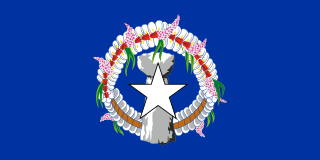
The Northern Mariana Islands, officially the Commonwealth of the Northern Mariana Islands, is an unincorporated territory and commonwealth of the United States consisting of 14 islands in the northwestern Pacific Ocean. The CNMI includes the 14 northernmost islands in the Mariana Archipelago; the southernmost island, Guam, is a separate U.S. territory. The Northern Mariana Islands were listed by the United Nations as a non-self governing territory until 1990.
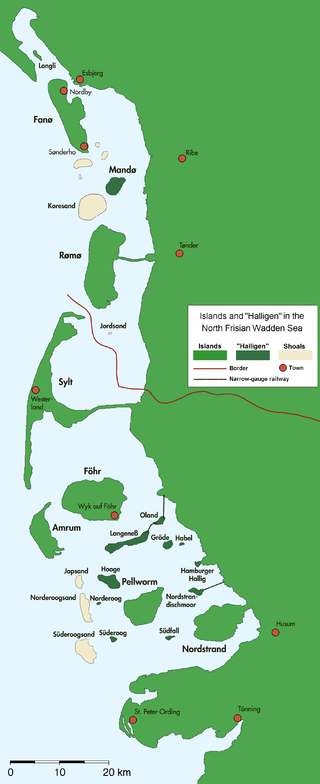
The North Frisian Islands are the Frisian Islands off the coast of North Frisia.

German New Guinea consisted of the northeastern part of the island of New Guinea and several nearby island groups and was the first part of the German colonial empire. The mainland part of the territory, called Kaiser-Wilhelmsland, became a German protectorate in 1884. Other island groups were added subsequently. The Bismarck Archipelago, and the North Solomon Islands were declared a German protectorate in 1885; in the same year the Marshall Islands were bought from Spain for $4.5 million by the Hispano-German Protocol of Rome; Nauru was annexed to the Marshall Islands protectorate in 1888, and finally the Caroline Islands, Palau, and the Mariana Islands were bought from Spain in 1899. German Samoa, though part of the German colonial empire, was not part of German New Guinea.
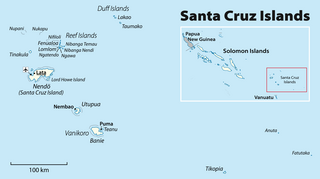
The Santa Cruz Islands are a group of islands in the Pacific Ocean, part of Temotu Province of the nation of Solomon Islands. They lie approximately 250 miles to the southeast of the Solomon Islands archipelago. The Santa Cruz Islands lie just north of the archipelago of Vanuatu, and are considered part of the Vanuatu rain forests ecoregion.

Eduard Gustav Freiherr von Toll, better known in Russia as Eduard Vasilyevich Toll and often referred to as Baron von Toll, was a Russian geologist and Arctic explorer. He is most notable for leading the Russian polar expedition of 1900–1902 in search of the legendary Sannikov Land, a phantom island purported to lie off Russia's Arctic coast. During the expedition, Toll and a small party of explorers disappeared from Bennett Island, and their fate remains unknown to this day.

Stick charts were made and used by the Marshallese to navigate the Pacific Ocean by canoe off the coast of the Marshall Islands. The charts represented major ocean swell patterns and the ways the islands disrupted those patterns, typically determined by sensing disruptions in ocean swells by islanders during sea navigation.
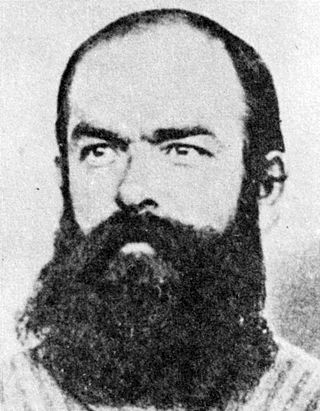
John Stanislaw Kubary also stated as Jan Stanisław Kubary, Jan Kubary, or Johann Stanislaus Kubary, was a Polish naturalist and ethnographer.

Wuvulu Island is part of the Western Islands of the Bismarck Archipelago in the western Pacific Ocean, part of Manus Province, Papua New Guinea. It is the westernmost island of the thirteen island groups that make up island chain in the archipelago. It is an island of volcanic origin encircled by a coral reef with a maximum height of three meters above sea level.

The Kampira Falls frog, also known as the Yaeyama harpist frog or harpist brown frog, is a species in the true frog family (Ranidae). Until recently known as Rana psaltes, it is found on Ishigaki and Iriomote in the Yaeyama Islands of Japan, as well as on Taiwan.

Carl Heinrich Michael Ribbe was a German explorer and entomologist.

The Bismarck masked flying fox is a species of flying fox in the family Pteropodidae found in Papua New Guinea and named after the Bismarck Archipelago. It was once considered a subspecies of Pteropus temminckii before being reassessed in 2001. This species has two subspecies, P. c. capistratus and P. c. ennisae. The IUCN classified it as Near Threatened in 2009, noting that the rate of decline is almost high enough to reclassify the species as Vulnerable.

This is a survey of postage stamps and postal history of the German colonies and part of the postage stamps and postal history of Germany, as well as those of the individual countries and territories concerned.
Augustin Friedrich Kraemer or Krämer was a German naturalist and ethnographer. Kraemer was a navy surgeon who worked in the Polynesia in 1893–95 and 1897–99.
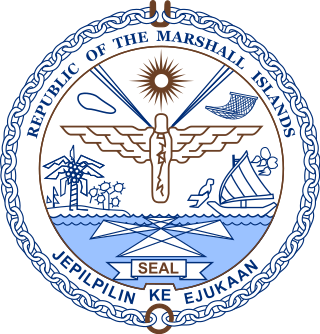
A package of constitutional reforms proposed by the Constitutional Council was held in the Marshall Islands in April 1995. In 1994 the Nitijela voted to create a Constitutional Council which would propose a raft of constitutional changes and reforms. The Council submitted thirty-five proposals, each of which had to attain a two-thirds majority of valid votes in order to pass. Turnout was low at 33%, and only a measure establishing the prevalence of the Marshallese language version of the constitution over the english one passed. All other proposals failed to reach the two-thirds bar, and thus failed.
Gerd Koch was a German cultural anthropologist best known for his studies on the material culture of Kiribati, Tuvalu and the Santa Cruz Islands in the Pacific. He was associated with the Ethnological Museum of Berlin. His field work was directed to researching and recording the use of artefacts in their indigenous context, to begin to understand these societies.
The following events occurred in December 1932:

Hernsheim & Co was a German trading company in the Western Pacific Ocean with main offices on Yap, Jaluit and Matupi. The company was specialized in the copra export to Europe and tried after the loss of their possessions in the South Seas (1918), a new beginning in the French Mandate area of Cameroon. In the heyday of their South Sea business, Hernsheim & Co exported almost 30% of the copra produced in the Western Pacific Ocean. Many of their agents were also dealers in ethnographic objects.
Palauan nationality law is regulated by the 1980 Constitution of Palau, as amended; the 1994 Palau Citizenship Act, and its revisions; and international agreements entered into by the Palauan government. These laws determine who is, or is eligible to be, a national of Palau. The legal means to acquire nationality, formal legal membership in a nation, differ from the domestic relationship of rights and obligations between a national and the nation, known as citizenship. Palauan nationality is typically obtained either on the principle of jus soli, i.e. by birth in Palau or under the rules of jus sanguinis, i.e. by birth abroad to parents with Palauan nationality. It can be granted to persons with an affiliation to the country through naturalization.















